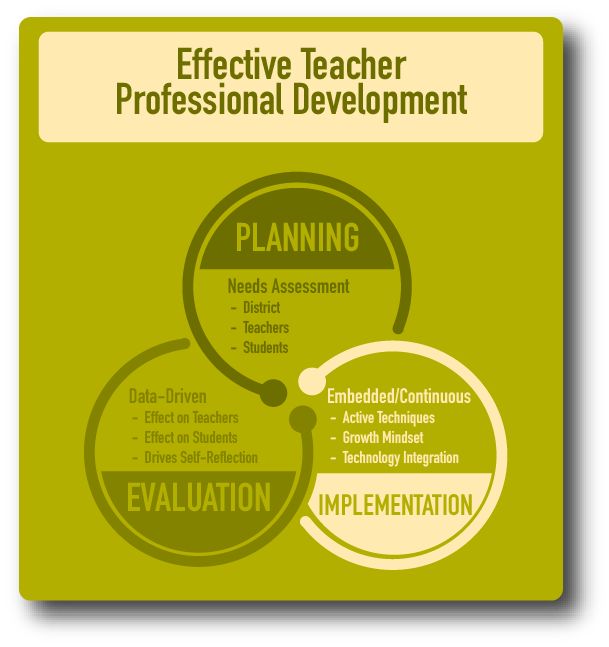
STEM Education Resources Teachers Actually Need in 2026
STEM brings together science, technology, engineering, and math in a connected way.
ALI Research Staff | Published July 05, 2023
The value of teacher professional development in facilitating student achievement cannot be overstated.
Here we discuss the importance of thorough planning, evaluation, and a holistic approach to professional learning and the concept of educative curriculum to promote ongoing growth and excellence in education.

The term teacher professional development refers to an organized and systematic process that strives to improve the knowledge, abilities, and practices of educators, enabling them to deliver excellent instruction and effectively support student learning.
Professional development is essential for fostering teacher development, increasing expectations for instructional methods, and ultimately improving outcomes for students.
It provides teachers the opportunity to enhance their methods of instruction, stay up to date on best practices and research, and form a dedication to lifelong learning.
Supporting teachers with professional development is especially important if we ask them to implement more effective, rigorous, and complex approaches, such as Project-Based Learning (PBL).
Effective professional development is ongoing, embedded, collaborative, and pertinent to teachers' needs and objectives.
To encourage significant and long-lasting change in teaching practices, it places a strong emphasis on active engagement, reflection, and continuous support.
Effective professional development involves differentiated instruction, hands-on learning experiences, modeling, peer collaboration, and feedback, drawing on research and evidence-based methods.
To ensure its impact on teaching and learning, it uses proven methods compatible with current educational trends.
Prior to designing a professional development plan, it’s essential to conduct a thorough needs assessment that includes teachers' input, observations, and analysis of student data.
This evaluation identifies particular areas that need work and establishes clear objectives for teacher growth.
In addition to aligning with district and school priorities, a well-designed professional development plan considers the identified needs and goals of teachers and provides a variety of learning opportunities, including workshops, conferences, coaching, and online modules.
It combines subject-matter expertise with pedagogical approaches and technological know-how to enhance all-around teacher development.
In an environment that values collaboration, teamwork, and a shared learning culture, professional development thrives.
The establishment of support structures like professional learning communities (PLCs) and mentoring programs increases the effectiveness of teacher development by providing ongoing guidance, feedback, and other types of assistance.
Effective professional development encourages educators to pursue continuous improvement by acknowledging that learning is a lifelong process. It encourages teachers to reflect on their own practices, explore innovative pedagogical approaches, and adopt a growth mindset.
The use of active learning techniques, such as problem-solving exercises, simulations, and case studies, engages teachers in instructional experiences that connect theory to practice.
These strategies promote critical thinking, active involvement, and the implementation of newly acquired knowledge and abilities.

Technology integration promotes opportunities for virtual collaboration, customized learning experiences, and access to online communities and resources.
It gives teachers the chance to experiment with innovative teaching techniques, keep up with technological developments, and leverage technology to improve their teaching methods.
An important and often overlooked aspect of teacher professional development is evaluation.
Evaluating the impact of professional development requires the collection and analysis of data, including teacher feedback, classroom observations, student assessments, and student growth data.
This data-driven approach is essential for measuring the effectiveness of professional development initiatives.
Effective evaluation of professional development must consider both its effect on student learning and the growth of teachers.
By examining changes in instructional practices and student results, educators can gauge the success of professional development activities.
To properly evaluate professional development, feedback and reflection must be ongoing. Educators can identify areas for improvement, improve their practices, and inform future professional development initiatives by offering constructive feedback and opportunities for self-reflection.
This promotes a culture of continuous improvement and increases the overall effectiveness of teaching and learning in the educational setting.
Professional development is a broad term that refers to a variety of activities and interactions that help teachers improve their skills, practices, and knowledge.
Typically, it is structured and organized by districts, educational institutions, or outside organizations. Professional development usually includes courses, seminars, conferences, workshops, and other officially structured learning activities.
The primary goal of professional development is to provide teachers with new knowledge, strategies, and resources to improve their teaching practices and student learning outcomes.
On the other hand, professional learning takes a broader and more comprehensive approach to fostering the growth of teachers.
It recognizes that education is a continuous process throughout life that extends beyond typical professional development activities. Through formal and informal opportunities for professional learning, teachers can deepen their understanding of their subject matter, pedagogy, and educational research.
Reflective practices, collective inquiry, and self-directed learning are strongly emphasized as crucial elements of professional growth.
While professional development often refers to structured and planned events or programs, professional learning encompasses a broader scope that includes a variety of learning experiences, both formal and informal.
Professional learning recognizes the importance of teachers taking ownership of their professional growth and seeking out opportunities for learning that are tailored to their individual needs and interests.
In recent years the concept of educative curriculum has been a topic of discussion and research. Educative curriculum fits nicely under the umbrella of professional learning since it happens outside of a formal PD environment.
The basic idea of an educative curriculum is a curriculum that is developed and presented in such a way that teachers who use it gain knowledge and skills in both content, but also pedagogy.
In other words, a teacher using an educative science curriculum, simply by implementing the curriculum, learns more about the science they’re teaching, how to teach it effectively, and gains pedagogical knowledge they can apply elsewhere.
As Davis & Krajcik (2005, p. 3) put it, “Educative curriculum materials should help to increase teachers’ knowledge in specific instances of instructional decision-making but also help them develop more general knowledge that they can apply flexibly in new situations.”
Think of an educative curriculum as the gold standard for STEM or any curriculum resource. Such resources are rare, but examples do exist.
An educational environment that promotes growth, improves instructional techniques, and ultimately improves student results must include teacher professional development.
Educators can identify areas for growth, improve their practices, and offer suggestions for future professional development efforts by engaging in continual feedback, reflection, and evaluation.
Professional development programs are more successful when they incorporate powerful techniques like active learning and technology, as well as a thorough planning process and collaborative support systems.
Furthermore, by viewing professional development in its broadest sense as a self-directed, lifelong process, educators are given the freedom to take charge of their own development and look for opportunities that fit their own needs and interests.
By adopting the idea of continuous learning and improvement, teachers can work for excellence in their classroom activities while contributing to the ongoing improvement of education as a whole.
References
Davis, E. A., & Krajcik, J. S. (2005). Designing Educative Curriculum Materials to Promote Teacher Learning. Educational Researcher, 34(3), 3–14. https://doi.org/10.3102/0013189X034003003

STEM brings together science, technology, engineering, and math in a connected way.

Mathematics can be a challenging subject for many students, requiring schools to have effective strategies in place to...

The news headlines are daunting. Math scores are down. School districts are scrambling to turn things around. And...